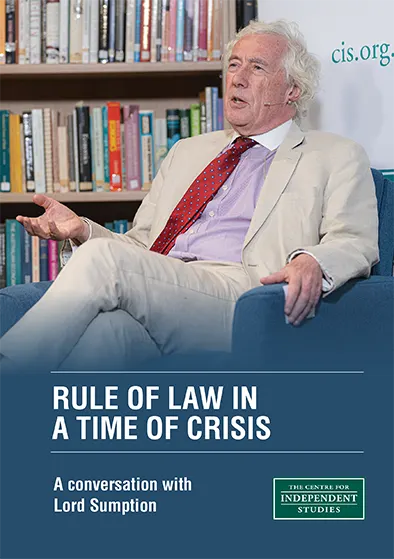
Lord Sumption became an outspoken critic of the policies surrounding COVID lockdowns he believed had “deprived everyone of what makes life worth living” and “thrown science out the window”. In his view, the British state “exercised coercive powers over its citizens on a scale never previously attempted … The ease with which people could be terrorised into surrendering basic freedoms which are fundamental to our existence came as a shock to me.”
His latest book, Law in a Time of Crisis, is a collection of essays based on his speeches on legal intervention in the political system over the last 10 years. Lord Sumption traveled to Australia as a guest of the Centre for Independent Studies and the Robert Menzies Institute for a series of lectures in Sydney and Melbourne. In an event at CIS, he gave his thoughts on the erosion of democracy, the dangers surrounding cancel culture, as well as overreach of the British government during the pandemic, and the political saga surrounding Brexit.
Introduction
Originally an Oxford history Don, Jonathan Sumption has written the definitive multi-volume history of the Hundred Years War during the Middle Ages. Lord Sumption became what is widely regarded as a brilliant QC before he served as a justice on the UK Supreme Court from 2012 to 2018. A music lover, he sits on the board of English National Opera. He is also a linguist who speaks fluent French and Italian and reads Spanish, Portuguese, Dutch, and Latin. In 2019, he delivered the prestigious BBC Reith Lectures, which are the British equivalent of the ABC Boyer Lectures, on the relationship between politics and the law. The subsequent book, Law in a Time of Crisis, published by Profile Books, is a collection of essays based on speeches by Lord Sumption on legal intervention in the political systems over the last 10 years.
In a Sunday Times review of that book, Roland White remarked: “You might find it difficult to tell whether Sumption is a historian who happens to be a lawyer, or a lawyer with an exaggerated sense of history. What is not in doubt is the fluency of his writing, he’s lively and entertaining on even the most arcane of subjects.” I think it’s fair to say that Lord Sumption in short, is a true renaissance man.
Tom Switzer, Executive Director
Rule of Law in a Time of Crisis
How I became a ‘sounder-off’
I’ve been in Australia now for just under a week, and I’ve spent most of that time sounding off on quite a wide variety of subjects, a continuation of a habit I refined in the United Kingdom. I thought that – by way of a very brief introduction to this discussion – I might try to explain to you how I became a ‘sounder-off’. Until 2012, when I went to the Supreme Court bench in the UK, I was a perfectly harmless lawyer. I read books on history, and I represented clients in a variety of cases, the majority of which were rather dull.
Upon joining the Supreme Court, suddenly things that I might write became a bit more important than they had been when I was simply voicing my client’s case. When I retired from the court on reaching the statutory retirement age in 2018, I went on to deliver the Reith Lectures for the BBC. These were the result of a good deal of reflection provoked by the role of the Supreme Court as the nearest thing we have in the UK to a constitutional court. Given that many people think we don’t have a constitution in the UK, it came as a surprise to many that a lot of the decisions that the Supreme Court makes are actually about the constitution.
In particular, the cases arising out of the departure of the UK from the European Union brought about really very significant constitutional issues. The most important of those were the two cases brought by Gina Miller, both of which were essentially about the rights of the government to sideline parliament in its negotiations with the European Union after the referendum. I was a party to the majority judgment in the first Miller case, and I’d left the court by the time that the second case – about the illegal prorogation of parliament – was decided. However, I did publicly comment on it, and defended the result against some fairly savage attacks from the anti-European wing of the Conservative Party. That’s essentially how I became a sort of pundit.
It was a largely accidental process. To some extent, I suppose it arose out of the Reith Lectures, and to some extent out of the fact that, on the whole, judges tend – even in retirement – not to comment on legal issues. Some of my former colleagues certainly thought that I should have been more scrupulous in observing that convention. As a matter of fact, I think they were probably right, but I don’t think I overstepped the mark. As there was a very large measure of misunderstanding about the constitutional nature of the dispute in the Gina Miller cases, it seemed to me to be an important public function to enlighten people about what this was about. In other words, it wasn’t about whether we ought to be leaving the EU, which wasn’t a legal issue at all. It was really about the attempt to marginalise parliament and deal with it purely as a governmental matter, free of tiresome parliamentary scrutiny, and that is what I was talking about.
Of course, it was an issue which — although I was only discussing the legal and constitutional aspects — had very powerful political ramifications. So for that reason, I asked not to be listed in any future Supreme Court cases. Although I had retired, retired judges of the Supreme Court go onto what is called the supplemental list, which means they are available to be called back to sit on cases if shorthanded, or the court needs a specialist in some area. Because I had become quite a vocal commentator on the constitutional implications of Brexit, I asked not to be listed.
I did transgress the conventions when Covid hit because I decided – after a considerable amount of hesitation – that the measures taken by the government on a relatively shaky legal basis involved a quite serious governmental failure. Whatever one might think about the merits of lockdowns, there was an absence of any serious consideration of the downside in terms of economic, societal, mental health issues, education, and so on. It wasn’t so much that they’d been outweighed, they’d not even been considered. I thought this was a serious governmental failure, and that the delivery of policy to professional epidemiologists who were only interested in one aspect of a very complicated issue reflected extremely badly on our standard of government. This state of affairs was partly attributable to public fear, and partly to some well-known defects in the personalities of the people who ran the government at the ministerial level.
At that stage, I actually asked to be removed from the supplemental list. I’m very glad I did, because a freedom of information request subsequently resulted on the production of my correspondence with the President of the Court. It was hoped that this would reveal a scandalous conflict of interest, and I was quite gratified when it was generally acknowledged that it revealed the opposite. Anyway, I do try to avoid becoming an all-purpose pundit on any subject that comes up. I try to stick to constitutional issues, and to Covid. My relations with my former colleagues are still very warm, I hasten to say. But at any rate, I suppose that that explains why I’m here, and to those of you who have come, I suppose you might want to know what the hell I’m doing, and that’s the best I can give you by way of explanation.
Erosion of democracy
I’m a natural optimist, but not on this subject because I think we take democracy for granted. We tend to forget that it is an inherently unstable form of government because it tends very easily to lead to public fear, and to too much power being entrusted to demagogues who are thought to be one salvation from this or that problem.
Democracies have only existed in any recognisable form in western countries, and then only for about two centuries. What has sustained it during that time is not just the formal institutional framework, the fact that we have elections and so on, but a culture that enables that to work. That culture involves a high degree of respect for opinions that we happen to disagree with. It involves a measure of restraint in the actual use of powers that have to exist for emergencies, but which can be deeply destructive if used too indiscriminately.
So these are all vulnerabilities of democracy. When people start feeling that it’s more important to get what they regard as the right answer than to do it in accordance with a procedure which may yield a result that they do not want.
There always have been people who object to democracy, but on the whole, they have been prophets crying in the wilderness. What I think is striking about the current state of affairs, as it has developed over the last half century, is that it’s become much more widespread. It has become particularly strong among the younger generation because of another problem or vulnerability of democracy – that it is highly dependent on economic optimism. It’s extremely difficult to maintain faith in a system of government which has ceased to be able to deliver the continual improvement people expect, and which with a rising population is probably necessary.
Blindness of cancel culture
The recent case where a newly-appointed Essendon Football Club chief executive, or rather the religious group to which he belonged, was said to hold the wrong views on abortion is a very good example of what is wrong with that kind of reaction. Abortion is a huge moral issue. My own view is that there ought to be a clinically regulated right of abortion in any civilised country. But I would certainly never suggest that you cannot legitimately hold the opposite view. It’s a major moral dilemma. The objection to abortion is shared by a number of religious groups, notably the Catholic Church, which is a major force.
I think to suggest that somebody who adheres to the doctrines of the largest Christian denomination in the world is unfit to manage a football club is a very strange idea. It’s not an eccentricity peculiar to Australia. We’ve had innumerable examples of that sort of thing in Europe some years ago. The entire European Commission was threatened by the European Parliament with being dismissed because one of their number adhered to the Catholic teaching that gay sex was sinful.
Well, I don’t happen to agree with that proposition, but again, it’s a moral issue on which large numbers of people, including Catholics, do agree. We had a football manager rather closer to the Essendon case some years ago who adhered to a rather wacky Buddhist sect. It believed that disabilities were the result of sins committed in an earlier life, when you were a different kind of animal; a proposition, which was shortly afterwards endorsed by the Dalai Lama. As a result, he was forced out as the chief coach of the English football team. I think that was mad for exactly the same reason.
The toppling of statues involves an extremely one-sided view about human nature. Edward Colston, a 17th century millionaire, whose statue was pulled down in Bristol had made a part of his fortune, probably not that large a part, out of shares he held in the Royal Africa Company, which was at that time the principal slave-trading company in England. But the reason there was a statue erected to him in Bristol was that when he died, he left his fortune to found hospitals, almshouses, schools, and other obviously publicly beneficial institutions.
Regardless of what one might think of Colston’s indirect participation in the slave trade, which was at that time a perfectly lawful and moral trade, what the statue was commemorating was his activities as a benefactor of the City of Bristol, of doing things that I think everybody would agree were entirely admirable. But the mentality behind the people who pulled the statue down was that if you have engaged to whatever degree in the slave trade, nothing else about your life matters. That’s the proposition that I object to.
No human being, or hardly any human being, is ever wholly good or wholly bad. We are all light and shade. It seems to me that a state of mind which says that because you have committed what a later age regards as sinful, you simply disregard everything that you have done, which a later age might regard as admirable. That seems to me to be an extraordinary piece of fanaticism.
The four people principally responsible for pulling the statue down were subsequently prosecuted, and at their trial, their defence was that their human rights entitled them to pull down the statue because they held a genuine belief that the existence of a statue in the heart of Bristol commemorating somebody who had been engaged in the slave trade was an inequity and that they were entitled to destroy it. The judge gave a very muddled summing up, which basically said: ‘Well, if that was a genuine belief, that was a good defence’. So the jury acquitted them.
Earlier this month, the Court of Appeal ruled that the judge should not have given that direction, and that the genuineness of one’s belief was never an excuse for destroying public property, a proposition which I regarded as self-evident before the verdict and, indeed, afterward as well. But when I wrote a newspaper article saying that I thought that this was an extraordinary travesty, a great cohort of well-meaning but rather muddled opinion descended on me with objections.
Some of them said the judge’s direction was manifestly right, which we now know is not true. Some of them said it ought to be right, whether it is in law or not. The law on the whole is on the side of the angels on this, but the law is only one aspect of this.
I’m prepared to accept that one would not wish to commemorate slave trading in a statue now. Let us suppose that a statue had been erected to somebody who did nothing else with his life but trade in slaves and there was an inscription under it, which said, ‘Jay Smith, hero of the slave trade’. That would be a ridiculous thing to do. I’m not suggesting you’d be entitled to pull it down, but one would be perfectly entitled to object to a statue for exactly the same reason that one might object to putting up a statue of Hitler. But that’s not the position [with Colston]. The position is, here is a man who did something which by modern standards is bad and a lot of things which by modern standards are good. It’s the one-sidedness, the falsification of the past by taking only one aspect of a man’s personality and treating it as the whole that I object to.
I have never met somebody today who thinks that slavery was a good thing. This is an intellectual battle that is no longer taking place because it’s been won. It’s been won comprehensively, and completely. So frankly, I think that we don’t need to pull statues down in order to advance that debate. The debate is over.
Lockdown falsehoods
I think that the whole debate on the epidemiological side for Covid lockdowns was based on a false comparison. It was based on a comparison between what would happen if nobody took any measures to protect themselves and what would happen with a lockdown. The idea that human instinct for self-preservation was going to be in some way suspended during the pandemic so that the counterfactual, that you should assume that nobody does anything to protect themselves, was ridiculous. My view is that the government should have made use of one of the most helpful aspects of the pandemic, which is that it affected primarily known categories of vulnerable people. Everybody was equally vulnerable to getting the disease but, with a very small number of exceptions, the only people vulnerable to either becoming seriously ill or dying were the old and people suffering from a finite list of identifiable clinical conditions, mostly affecting the respiratory system.
We should have persuaded such people voluntarily to take measures for their own protection, which would have enabled the great majority, who were in good health and in the prime of life, to continue to live normal lives. Instead, we adopted in response to a highly discriminating pathogen, a wholly indiscriminate policy. The test of that is Sweden, because that is exactly what the Swedes did, and it’s what we set out to do. The pandemic plan that we, in common with most European countries, had prepared in advance envisaged that we would not use coercion and that we would concentrate our efforts on dealing with the problem of the most vulnerable categories – something which was easier to do with Covid-19 than with any other recent epidemic pathogen.
My view also puts public safety first. I think that it is quite possible that a small increase in the death rate or the hospitalisation rate would have resulted from my proposal for a voluntary system, by comparison with what we actually did. But is a small reduction in the death toll worth the long-term and catastrophic damage that we have done to a generation of school children; that we have done to those vulnerable to mental illnesses? Is it worth the extraordinary economic damage, the wrecking of the public finances, the accumulation of debt for future generations? My view is no, you would need quite a large death toll to outweigh that.
We do not, of course, know what would have happened in Sweden if they had had a lockdown, but what we do know is that the results of a voluntary policy there were, in death toll terms, hugely more favourable than those in the UK – and Sweden is a broadly comparable country. It is sometimes said the density of population in Sweden is much lower than the UK. That is only true if you count the frozen wastes of the north where nobody lives. Eighty-five percent of the population of Sweden lives in Stockholm. Density of population is higher than it is in London.
Assange’s extradition
I think the problem that Julian Assange faces is that the UK has a very one-sided treaty with the United States, which entitles the US, with minimal exceptions, to get extradition on demand. No such right is conferred on us, vis-a-vis people in the United States we might want extradited. Given that Assange’s activities took place entirely outside the United States, the extradition request essentially depends on the right of the US to contend that any crime which produces consequences in the United States, ought to be justiciable in the United States. It’s not a proposition that I am willing to accept. So frankly, I would not extradite Julian Assange.
I’m not an admirer of Assange because it seems to me that free speech is a right, which I’m foremost in defending, but free speech is not the same as a right to steal other people’s information. Assange believes that governments have no right to have secrets. I think that this is a perfectly absurd proposition. Many aspects of government, ranging from bank regulation to defence require that governments should have secrets. Not only does Assange reject that proposition, but he obtains the information by suborning the loyalty of an admittedly rather cranky serving officer in the United States Armed Forces. I’ve got absolutely no sympathy for Assange but I still would not have extradited him.
Brexit blunders
The problem about this whole Brexit issue is that both sides of the argument seem completely incapable of weighing up pluses and minuses. Most issues of public policy are not clear cut. It’s a question of weighing the pros and cons. People say the EU is a defective institution, and I agree. But I still think we should remain, because the advantages outweigh the disadvantages, great as the latter are. First of all, I do not buy the patronising explanations that it is comforting for many Europeans, and many Europeans in Britain, to utter about why this happened. I don’t accept that this was a piece of post-imperial nostalgia. I don’t accept that it was because the UK public was gullible. They were lied to, but nobody believes the lies.
I don’t accept that it was an indirect way of objecting to globalisation. I think it was quite simply what it professed to be. The slogan, take back control, persuaded a lot of people, and my reason for disagreeing with them is essentially that you don’t take back control by leaving an institution which is going to dominate you, even if you’re not a member of it. It’s a half-billion market, right next to us across the channel. It’s going to overshadow us economically anyway, so we might as well have at least the degree of control that we had before leaving by participating in its decision-making process. We were one of the most influential members of the EU. We’ve lost that now, so we’ve lost control, essentially.
The Scottish bid for independence
I think it’s quite likely that the Supreme Court will find that Nicola Sturgeon cannot have her referendum without Westminster’s consent, because that is what the Scotland Act says, in black and white. This was a deliberate decision when Scotland was given a large degree of autonomy that the constitutional future of the relationship between the UK and Scotland was expressly reserved as a matter within the exclusive jurisdiction of Westminster.
So unless something very surprising happens, it is going to be blocked. The legal powers are all in the hands of Westminster, and UDI [Unilateral Declaration of Independence] is not an option because a heavily indebted Scotland, which is what it would be, would find it impossible to raise money on the international markets if it was not a legally-recognised government. As to what will happen if Sturgeon seeks to make the general election a referendum on Scotland and its independence, I think the problem is that it is not within her power to decide this.
It is within the power of the voters; if the voters are not prepared to treat it as a referendum on independence, well, that’s the end of that. What she really means, I think, is that if she wins a majority of Scottish seats, she will be able to claim that it shows that a majority want independence. Well, first of all, past experience suggests that there are a large number of people who vote for the SNP who do not believe in independence. After all, it has 58 of the 60 parliamentary seats, but couldn’t muster more than 45 percent in the [first] referendum. Secondly, it doesn’t alter the basic position, which is that the SNP wants independence and the UK is saying no.
And that is just as likely going to be the situation afterwards. No national party at Westminster, none of the three major national parties, finds it in their interest to concede Scottish independence. The Labour Party would find it very difficult to form a majority government ever again without Scottish seats. The Conservative Party, although it would benefit from the departure of Scotland, is adamantly against the secession of Scotland on principle.
The Liberal Democrats are the same. So in my view, it’s not going to happen unless the Labour Party reaches a Faustian pact to let them have their referendum in return for support. Well, it would only last for half a parliament because if Scotland then seceded, that would be the end of any possibility of Labour deriving votes from Scotland – so I don’t think that’s going to happen.









